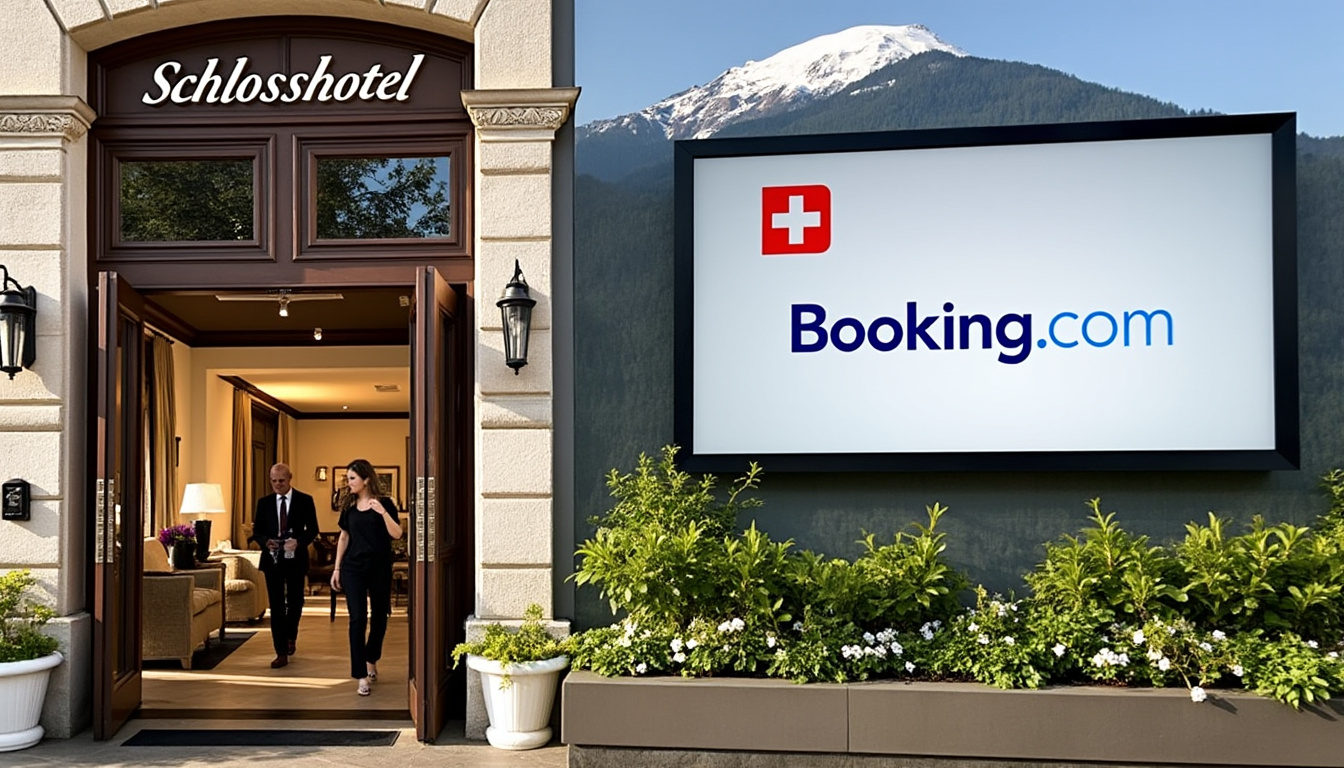In a significant move impacting the hospitality and online booking industry, the Swiss price regulator has mandated Booking.com to lower its commission rates for hotel reservations within Switzerland. This decision, following an extensive investigation, underscores the ongoing debate regarding consumer rights, market fairness, and the balance of power between large e-commerce platforms and smaller businesses. The announcement, which has been covered extensively by various news outlets, has raised questions about the implications for both consumers and the hospitality sector as a whole.
Understanding the Swiss Pricing Regulation Framework
The Swiss price regulation framework is designed to ensure fair pricing practices across various markets, including travel and hospitality. Recent interventions by the Swiss price regulator serve as a clear indicator of its commitment to protecting consumer rights and promoting competitive practices. The latest directive concerning Booking.com follows a rigorous analysis of pricing structures prevalent in the online booking industry.
Traditionally, Booking.com has operated with significant latitude, often charging hotels high commission rates for each booking made through its platform. These rates, which can reach up to 25% or more, have drawn criticism not only from hotel owners but also from consumer advocacy groups who argue that such fees ultimately lead to higher prices for consumers. The Swiss price regulator’s action specifically aims at reducing these commission rates by nearly 25%, a move that represents a fundamental shift in the relationship between online travel agencies and their hotel partners.
In examining the regulatory landscape, it is crucial to note how this situation reflects broader trends across Europe and even globally. Regulators in various countries have increasingly scrutinized the power dynamics between large online platforms—often referred to as “gatekeepers”—and smaller local businesses. In this context, the Swiss price regulator’s action could serve as a precedent for other nations looking to intervene similarly in their domestic markets.
The Impact of High Commission Rates on Hospitality
The implications of high commission rates charged by platforms such as Booking.com are multifaceted. Firstly, these costs can severely impact the profitability of hotels, particularly smaller establishments that may not have the financial flexibility to absorb such fees. In many cases, hotels are compelled to pass these costs onto consumers, leading to inflated prices for travelers. This situation raises significant concerns regarding consumer choice and pricing transparency.
Moreover, the reliance on an online booking platform like Booking.com can create challenges for hotels in terms of brand loyalty and direct customer engagement. Hotels are often left with limited options for gathering customer data or fostering direct relationships with their clientele. When consumers book through a third-party site, they are less likely to feel a connection to the hotel brand, which can impact repeat business and overall customer satisfaction.
To illustrate the situation, consider a small hotel in the Swiss Alps that relies heavily on online travel agency bookings. With Booking.com’s commission rates, the hotel may struggle to offer competitive prices while ensuring its operations remain viable. As a result, the hotel could see a decline in occupancy rates during peak seasons, ultimately affecting its reputation and long-term sustainability.
- High commission rates lead to increased travel costs for consumers.
- Smaller hotels face challenges in maintaining profitability.
- Reduced direct engagement opportunities with customers impact brand loyalty.
As this regulatory action unfolds, it opens up opportunities for hotels to reassess their pricing strategies and explore alternative channels for bookings. Increasingly, hotels may need to invest in their marketing strategies to promote direct bookings, leveraging their own websites and social media platforms to foster stronger connections with customers.
| Aspect | Impact of High Commission Rates | Potential Advantages of Reduced Rates |
|---|---|---|
| Consumer Pricing | Higher overall travel costs | More competitive pricing for travelers |
| Hotel Profitability | Strained finances for smaller hotels | Improved financial health and sustainability |
| Brand Loyalty | Limited connection with customers | Increased opportunities for direct engagement |
The road ahead for both the Swiss price regulator and Booking.com remains to be seen. As the platform prepares to comply with the directive, it will undoubtedly reconsider its pricing strategies and relationships within the Swiss hospitality sector.

The Role of Consumer Rights in Price Regulation
Consumer rights form the backbone of the Swiss price regulation initiative, influencing the dynamics of how services are priced within the travel industry. The primary aim of the Swiss price regulator’s actions is to promote fair pricing practices, ensuring that consumers are not unfairly burdened by excessive costs hidden within commission fees.
In recent years, there has been a growing awareness and advocacy surrounding consumer rights in many European markets, including Switzerland. This awareness has led to increased scrutiny of pricing practices across various industries. With the rise of e-commerce and the dominance of platforms like Booking.com, consumers are becoming more vocal about their rights and expectations regarding fair pricing. This societal shift has put additional pressure on regulators to take measurable action.
Booking.com’s practices have, over time, faced significant critique from consumer organizations. Often, users are unaware of the added fees associated with a booking until they reach the checkout stage, leading to frustration and a perceived lack of transparency. The recent mandate by the Swiss price regulator aims to rectify this situation, aiming to simplify pricing for consumers while ensuring fairness in the market.
Examples of Consumer Advocacy in Action
Multiple instances across Europe showcase how consumer advocacy groups have successfully lobbied for regulatory changes that enhance consumer rights in the travel sector. For instance, in recent years, the European Commission has taken measures against unfair pricing practices among various online travel agencies, pushing for improved transparency in terms of fees and pricing structures.
Another notable example comes from recent legislation in Spain, where the government implemented stricter regulations on Airbnb and similar platforms to ensure equitable pricing practices and better consumer protection. This move was spurred by widespread complaints from consumers who felt exploited by high fees and limited options for recourse.
- Switzerland’s price regulator aims to promote fair pricing and transparency.
- Consumer organizations have successfully advocated for change across Europe.
- Increasing awareness leads to heightened scrutiny of online booking platforms.
As consumer rights continue to gain momentum worldwide, the landscape of online travel and hospitality will undoubtedly evolve. Hotels and online platforms must adapt to this shifting paradigm by demonstrating their commitment to fair practices. This change will likely benefit not only consumers but also businesses that prioritize transparency and customer service.
| Consumer Rights Issue | Response by Regulators | Expected Outcome |
|---|---|---|
| Lack of Transparency in Pricing | Mandating clearer pricing structures | Increased trust among consumers |
| High Commission Fees | Reducing commission rates | More competitive travel costs |
| Limited Rights for Recourse | Enhanced regulations on consumer protection | Improved consumer satisfaction and reliability |
In this evolving environment, consumers have the power to influence market practices simply by asserting their rights and expectations. The sustained focus on consumer advocacy will likely lead to a more equitable and transparent travel marketplace.
Market Dynamics and their Influence on E-commerce Strategies
The directive from the Swiss price regulator is not merely a question of compliance for Booking.com but a strategic pivot in response to evolving market dynamics. The online booking landscape is increasingly competitive, and companies must adjust their strategies to stay ahead. This mandate presents both challenges and opportunities within the hospitality sector, as market dynamics continue to shift.
In today’s e-commerce environment, consumers have a wealth of information at their fingertips, enabling them to compare prices and seek out the best deals. This awareness has created a more discerning consumer base that prioritizes value and transparency. Consequently, companies like Booking.com need to reevaluate their offerings and marketing strategies to retain relevance.
As more consumers turn to price comparison websites and alternative booking platforms, traditional players like Booking.com may find themselves under increasing pressure to innovate their strategies and provide added value. This shift is likely to encourage more personalized service offerings, enhanced user experiences, and a greater focus on brand loyalty.
Strategies for Adapting to Market Changes
For businesses operating in the travel and hospitality space, adapting to these market changes is essential for survival and growth. Here are a few strategies that can be implemented:
- Enhanced Customer Engagement: Hotels can invest in building relationships with customers through personalized offerings, loyalty programs, and responsive customer service.
- Investing in Technology: Implementing advanced booking systems or utilizing AI for personalized marketing can provide hotels with a competitive edge.
- Direct Booking Incentives: Hotels should consider offering perks for direct bookings, such as discounted rates or complimentary services.
Such strategies not only align hotels with evolving market dynamics but also demonstrate resilience and flexibility in the face of regulatory changes.
| Market Strategy | Description | Potential Benefits |
|---|---|---|
| Customer Loyalty Programs | Creating rewards for repeat customers | Increased retention and customer satisfaction |
| Technology Integration | Using technology to enhance user experience | Streamlined booking processes and improved service |
| Transparent Pricing | Ensuring clear communication of pricing | Building trust and encouraging bookings |
In navigating these market dynamics, companies that prioritize adaptability and consumer-centric practices will likely emerge as leaders in the evolving landscape of travel and hospitality.

Future Outlook for Online Booking Platforms and Hospitality
As the dust settles on the Swiss price regulator’s ruling, the future for Booking.com and similar platforms remains uncertain yet promising. The hospitality landscape is at a crossroads, with regulatory reforms serving as catalysts for transformation. With increased consumer awareness and advocacy, the industry may see shifts that prioritize fairness and transparency.
Looking forward, online booking platforms like Booking.com could benefit from reassessing their business models and exploring collaborations with hotels to create more equitable and sustainable practices. Such collaborations might foster innovation in service delivery and improve the overall guest experience, aligning more closely with the expectations of modern consumers.
Potential Changes in the Industry Landscape
The hospitality sector may also witness a more significant emergence of alternative platforms and direct booking options. As traveler preferences evolve, the demand for personalized travel experiences and diverse accommodations will drive innovative solutions. Properties may shift away from reliance on traditional platforms, opting instead for direct engagements through their own websites or emerging niche travel platforms.
Furthermore, emerging technologies like blockchain and AI could revolutionize the booking process, enhancing transparency and security for consumers. These technologies could empower travelers with better information, leading to improved decision-making when booking accommodations.
- Increased collaboration between hotels and online platforms likely to emerge.
- Shift towards personalized travel experiences will reshape the booking landscape.
- Emerging technologies may lead to enhanced booking security and transparency.
This evolving industry landscape presents a wealth of opportunities for both consumers and businesses willing to embrace change and prioritize sustainable practices. The future may compel online booking platforms to reimagine their models, ultimately benefiting the broader hospitality sector and enhancing the consumer experience.
| Area of Change | Potential Industry Impact | Opportunities for Hotels |
|---|---|---|
| Business Model Innovation | Emergence of new platforms and booking solutions | Access to a broader customer base |
| Consumer Preferences | Demand for personalized experiences | Ability to create unique offerings |
| Technological Advancements | Improved clarity and security in transactions | Enhanced customer trust and loyalty |
The Swiss price regulator’s demand for Booking.com to lower its prices marks a pivotal moment in the travel and hospitality sectors, potentially influencing the landscape for years to come. Observing how industry players respond to this change will provide key insights into the future of hospitality and consumer relations.
